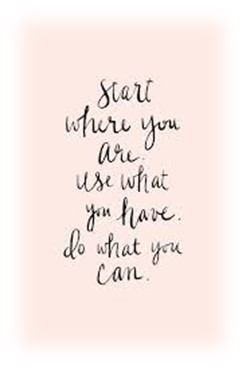
I don’t know about you, but I love the first few weeks of the new year! Everything seems so fresh and full of possibilities. I usually spend some time during the week between Christmas and New Year, when none of us knows what day, it is and we are way too full of sweets, reflecting on the past twelve months. What went well? what lessons did I learn? What are some things that I need to focus on in the coming year? It is a very joyful, yet sobering, process for me.
As I reflected over the last couple of years, I noticed some patterns in my life. One main thing I noticed was that I would start strong with great intentions, and then fizzle out before I changed my habits or behaviors. UGH! How many of you can relate to that?
Last week I had the privilege to give a talk on goal setting at a local Better Breathers Club. It was then that I realized that I was not following my own “goal-setting” advice. I would come up with something that I wanted to add or change, but then not spend time laying out the steps to accomplish that goal. Like my dad always says, “failing to plan is planning to fail.” So, this year, I plan to set SMART goals.
What is a SMART goal? I am glad you asked and I would love to tell you! But first, let's talk about what exactly a goal is.
What is a Goal?
- A goal is a target or something we want to achieve or a destination we aim for. It can be getting better at something, finishing a project, or turning a dream into reality.
What is Goal Setting?
- Goal setting is when we make a plan for what we want to accomplish, creating a map with specific steps to follow. Goal setting helps us stay on track and succeed in reaching our destination.
Why is Goal Setting Important?
Goals show us where we want to go and what we want to achieve. They help us decide what's most important and where we should focus our efforts. Like a map, goals guide us on the path to success.
Goals give us something to look forward to and get excited about. When we reach small goals, it feels awesome and makes us want to keep going. Having goals makes life more interesting and fun!
It helps us improve:
Goals help us see how we are doing and how we might do better. We learn and grow by working towards goals, even if we face challenges. Each step toward a goal is a chance to become better and achieve success.
What is a SMART goal?
S: Specific, saying exactly what needs to be done.
M: Measurable, so it is easy to see progress.
A: Achievable, meaning it is something we can really do.
R: Relevant, meaning it fits into what is important to us.
T: Time-bound, so we have a clear deadline to keep us on track.
Here is an example of a SMART goal related to nutrition:
Smart Goal: Eat one serving of fruits or vegetables at lunch every day for the next month.
Why: This goal is specific (one serving of fruits or vegetables), measurable (daily at lunch), achievable (small dietary change/addition), relevant (supports overall healthy eating), and time-bound (for the next month).
Here are a few things to remember when setting goals:
- Decide what is important to you and set goals around those things.
- Give yourself permission to adapt your goals as needed. Listen to your body!
- Use positive self-messaging. Be your own biggest cheerleader. Tiny steps add up!
- Tell someone about your goal. Everything is better with community!
- Write your goals down. This helps you to see how far you have come and remember your why.
- Use forums like COPD360social to find others who understand and can help you on your path!

There are many things that you can set goals around but starting small is one key to success. Choose something doable and take one step at a time to get there. What does that look like, you ask? Well, let’s take the nutrition goal we set for example. Nutrition is something important. Food is fuel and we need to fill our bodies with good fuel! If you notice, the goal is not giant. We did not set a goal to lose 75 pounds or plant a 7-acre garden (when we have never even had luck growing 1 tomato). We started with a small step that will make a big impact. One serving at one meal, for one month. Having smaller goals that build up to a major change helps us to stay on track.
Oh, and one other thing. Aside from setting goals for the new year, I like to do a review of my medications so that I can talk to my doctor about them during my next visit. Are they still working well? Do I know how to use them properly ? Paying attention to how medication manages symptoms should be an ongoing thing, but a couple of times a year spend a little extra time thinking about it. My dad always reminds me to change the batteries in my smoke alarms when the time changes. That could be a good time to do a medication review, or even better, monthly, or quarterly when you change the furnace filters in your house. I don’t know about you, but I love being able to group tasks to help me remember something important.
What goals are you setting for yourself this year and how can the COPD360 community support you? Do you have any tips for success? Let’s chat!